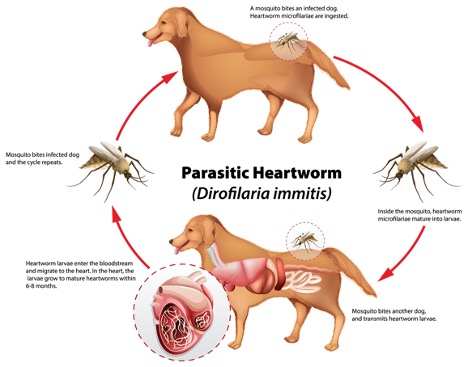Heartworm disease is a serious and potentially life-threatening condition, but it is also preventable. The key to prevention is understanding the disease, learning how to recognize the signs of infection in your pet, and getting them tested regularly. We’ll cover all that and more in this post about heartworm disease in pets.
What is Heartworm Disease?
Heartworm disease is caused by the bite of an infected mosquito. The mosquitoes’ bite can transfer the heartworm larvae, and those larvae can live inside your pet for months before they mature. Once mature, these worms can settle in the organs, blocking and damaging them, which can cause permanent damage or even death if left untreated. So, it’s important that pet owners understand the basics about heartworm disease to prevent their pets from becoming infected.
The Heartworm Cycle

When a mosquito bites an animal infected with heartworms, it sucks up the microscopic heartworm larvae (microfilariae). These larvae continue to develop in the mosquito, and the mosquito deposits the parasite into its next victim.
Symptoms of Heartworm Disease
While dogs, cats, and ferrets share some heartworm symptoms, symptoms can differ between species.
| Dogs | Cats | Ferrets |
|
Mild persistent cough Reluctance to exercise Fatigue after moderate activity Decreased appetite Weight loss
|
Difficulty or labored breathing Vomiting Decreased activity Loss of appetite Weight loss Convulsions. Blindness. Fluid in the lungs
|
Decreased activity Coughing Trouble breathing Overall weakness Heart failure can occur in severe cases |
Diagnosing Heartworm Disease in Pets.
At our state-of-the-art facility, we use diagnostic testing to pinpoint the underlying reason for your animal’s symptoms and present your options.
To diagnose heartworm disease in your pet, we typically use a series of tests to determine the presence of adult heartworms or larvae. We use an antigen test to detect the presence of proteins released by adult female heartworms. Also, we can also perform an antibody test to check for antibodies created by your pet’s immune system in response to an infected mosquito bite. We use ultrasound and chest X-rays to visualize a pet’s heart and lung tissue. If any of these tests detect the presence of heartworms, we may recommend additional tests to assess the severity of the infection.
Treating Heartworm Disease in Pets.
When treating heartworm disease, we consider your pet’s species, age, size, and overall health before treatment. Generally, standard treatments involve giving a series of closely monitored injections or administering oral medication over a short period. Depending on the severity of the infestation and your pet’s risk factors for developing complications, we may recommend additional testing to monitor the treatment. Regular checkups with your veterinarian are essential for monitoring progress and ensuring the success of a heartworm infection treatment plan.
Important note regarding ferrets: Unfortunately, there is no approved drug therapy for heartworm infection in ferrets. The drug used to treat infections in dogs is not safe for ferrets. However, we can often help ferrets with good veterinary care. You can read more about Heartworm in Ferrets from the American Heartworm Society.
Managing Post-Infection Symptoms.
After treatment, your pet will need close monitoring to minimize the risk of further complications. Symptoms such as weight loss, weakness, and lethargy may accompany heartworm infection initially. These may persist for several weeks or months after treatment due to the inflammation and damage caused by the worms in your pet’s body. Depending on the length and severity of the infection, additional treatments may be necessary to ensure continued health post-infection. Regular checkups with your veterinarian are essential in identifying any potential risks.
Heartworm Prevention
Prevention is the best protection against heartworm disease in your dog, cat, or ferret.
You can also reduce the risk of infection by avoiding areas known to have infected mosquitoes and other animals and by cleaning up standing water in your yard to prevent mosquitoes. Here are some areas to avoid:
- Temporary pools and ponds are created by melting snow or rain.
- Floodplains along streams and riverbanks.
- Irrigated fields and meadows.
- Containers that hold water and fill up after a rain shower.
- Tree holes that collect rainwater.
But most importantly, keep your pet on year-round heartworm prevention medication. Year-round preventative medications are the best way to reduce your pet’s risk of contracting heartworm disease.
Final Words
Heartworm disease is a serious, progressive disease that can lead to death if not detected and treated in time. Fortunately, we have diagnostic tests to detect the disease and we have preventative medicine. By working together with you and using all of our resources, we can help you protect your pet from any serious or fatal consequences of the disease. Please contact us to schedule an exam or preventative treatment.
Your Friendly Team at
Hammond Veterinary Hospital

